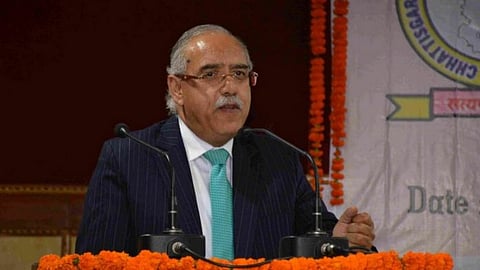

The Virtual Canteen focused on how certain laws in the country are being used to systematically suppress dissent and harass anyone who dares to speak up against the powers that be. The noted speakers detailed the importance of dissent to democracy, the need to change obsolete laws, and more, reports SIDDHARTH GANGULY.
——
THE Delhi High Court Women Lawyers Forum recently conducted a virtual canteen on the theme of, 'Our Right to Dissent'. The discussion was set against the context of the recent arrest of 22-year-old climate activist Disha Ravi for her involvement in the creation of the contentious 'Toolkit' shared by fellow activist Greta Thunberg in relation to the farmer's protest underway in the nation.
The keynote speakers at the event organised by Livelaw were former Supreme Court Justice Deepak Gupta, senior advocate Rebecca Mammen John and advocate and author Chitranshul Sinha. They were joined by advocates Ritu Bhalla and Manali Singhal and the session was moderated by lawyers Swati Singh Malik and Arundhati Katju.
Justice Gupta spoke about the broad nature of the sedition laws in the country. "Disaffection is such a broad term that anything could amount to sedition." He noted, adding that the right to dissent is a "hallmark of democracy" and that no party, once it comes to power, should be immune to criticism.
Justice Gupta also noted that the conviction rates in such cases are generally quite low and that in cases put forth to curb dissent, even if a person is acquitted, their reputation is "vandalised and destroyed". This attitude is also not limited to the judiciary, the former judge observed, remarking that people have lost their sense of humour in the past ten years and that now, he is afraid even to crack a joke lest he offends someone.
When asked about whether the Supreme Court should take Suo Motu cognisance in such cases, Justice Gupta noted that sedition should be a non-cognisable offence (meaning the police should not be able to make an arrest without a warrant in these cases) and that, while the apex court cannot take suo motu cognisance in every instance, the High Courts should take action. Magistrates need to be retrained and remand is not automatic, he said.
Rebecca John who was a very vocal detractor of the circumstances surrounding Disha Ravi's arrest and subsequent production in court without her lawyer being notified stressed the need for police forces to obtain a transit remand from the nearest magistrate when an accused is being taken to a different place.
The readiness of authorities to arrest anyone for voicing dissent and speaking out against the government led John to remark, "It seems personal liberty is being linked with procedural law."
John went on to speak about how various national security laws are being used to curtail individual liberties. "People who have expressed dissent with the policy of the government have been pushed in under special laws, like UAPA and other National Security laws," she said, adding that today it seems as though, "bail is the exception and jail is the right of the prosecuting agency."
Chitranshul Sinha whose book, 'The Great Repression', deals with the history and obsolescence of the sedition laws in India, noted that a judgement in the Kedarnath Court held that sedition can only be invoked when public order would be disturbed. Subsequent verdicts directed that the guidelines laid out in the Kedarnath case should be followed.
Sinha stressed the need for a "safety valve" if the sedition laws continue to remain in force. Adding to Justice Gupta's remarks on the importance of dissent in a democracy, Sinha said, "Dissent is a duty." He concluded his remarks by reiterating that sedition has become a tool for the ruling party to quell dissent and that, "It's high time that (Section) 124 (of the Indian Penal Code) should be challenged yet again. We need that space to express our opinion."
(Siddharth Ganguly is a journalism student at the Symbiosis Institute of Media and Communication, Pune, and is an intern at The Leaflet.)